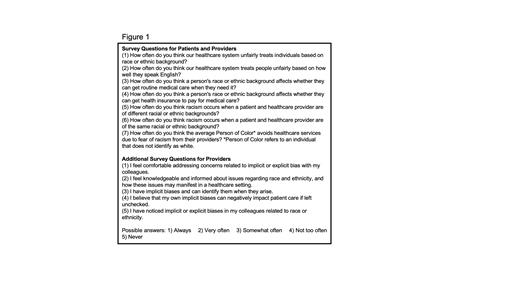Introduction: Health disparities have been reported in several areas of hematologic and oncologic care. The NCI reports African American males develop cancer 25% more frequently than White males, and they have 43% higher mortality compared to Non-Hispanic Whites in all cancers combined. Hispanic ethnicity is also disproportionately affected in cancer care, in part due to lack of health care access (J Oncol Pract. 2006). Within hematologic care, differences in care and outcomes have been reported in diseases including sickle cell disease (SCD). Patients with SCD experience health disparities, including lack of knowledge on treatment options and misconceptions on opioid addiction (Shapiro et al. 1997). Our goal was to gain firsthand patient accounts of experiences in access and quality of hematological care at the University of Colorado Anschutz Medical Center.
Methods: The study aimed to obtain surveys from 40 patients with 20 patients from under-represented minorities (Black, Hispanic, Native American, or Asian) and 20 patients from non-minority groups. Patients aged 18 or older treated in the Division of Hematology at University of Colorado were eligible for the study. Providers from our Division also participated the study. The surveys assessed general beliefs, experiences, and biases in 7 questions (Figure 1). Responses were based on a Likert scale ranging from ‘never’ to ‘very often’. Patients could also participate in an optional interview to further describe their experiences. Enrollment will continue through September 2023.
Results: Our interim analysis includes data from 15 patients, 4 non-Hispanic White, 3 Hispanic, and 8 non-Hispanic Black patients. 78 providers from our Division also participated in the survey. Non-Hispanic Black patients were more likely to respond that our healthcare system unfairly treats individuals based on race or ethnic backgrounds, and this was more likely to occur when a patient and healthcare provider were of a different race or ethnic background. This was not the case in the Hispanic patient cohort. Provider responses mirrored the responses from non-Hispanic Black patients, suggesting our providers are aware of disparities in healthcare. However, 78% of providers agreed they had implicit biases they could identify, and although 69% of them agreed theyfelt knowledgeable and informed about issues regarding race and ethnicity, and how these issues may manifest in a healthcare setting, 46% of providers noticed implicit or explicit biases in their colleagues related to race or ethnicity. Individual patient interviews gave further insight into areas where improvement can be made. Black patients, particularly those who volunteered their diagnosis of SCD, expressed there is a lack of knowledge in the treatment of SCD outside of specialized centers. Further, misconceptions about pain crises can lead to undertreatment. One subject stated “With sickle cell disease, sometimes we have a lot of pain even though it may not look like it”... “Because we live with pain every day, when we go to the ER it is because we are in excruciating pain ”. Other underrepresented minority subjects also discussed barriers to their healthcare. One subject stated “In 2016 when I came to the US, I was sick and I went to the Emergency and we were new in town” ... “we didn't have any insurance. I found myself with 20 thousand dollars in hospital bills”.... “I didn't know, and it was too expensive. And it impacted me negatively because I am afraid, being honest, if it wasn't for Medicaid I wouldn't come to the hospital, you wouldn't see me there”.
Conclusions: Our results highlight there are differences between the experience of our Black patients compared to non-Black patients. Further, provider questionnaires also highlight discrepancies about how we identify and address biases. Results from this study highlight areas needing improvement within our Division, which will lead to interventions such as bias training for providers. Further, dissemination of information on misconceptions on SCD at our institution, and at the community settings is critical to improving patient care for this patient population. Identifying additional barriers to health care access such as financial needs and lack of insurance is also critical to closing gaps within our healthcare system.
Disclosures
Pollyea:Ryvu: Consultancy; Qihan: Consultancy; Novartis: Consultancy; Medivir: Consultancy; Magenta: Consultancy; LINK: Consultancy; Kura: Consultancy; Jazz: Consultancy; Immunogen: Consultancy; Hibercell: Consultancy; Glycomimetics: Consultancy; Genentech: Consultancy; Bristol-Myers Squibb: Consultancy, Research Funding; BerGen Bio: Consultancy; BeiGene: Consultancy; AstraZeneca: Consultancy; Arcellx: Consultancy; Aptevo: Consultancy; AbbVie: Consultancy, Research Funding; Syros: Consultancy; Zentalis: Consultancy; Karyopharm: Research Funding; Teva: Research Funding. Jordan:AML JV: Consultancy.


